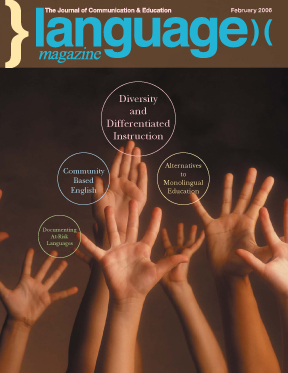Telling the “Truthiness”

Last month, the American Dialect Society announced that the winner for 2005 in its 16th Annual Words of the Year vote was “truthiness,” which refers to the quality of preferring concepts or facts one wishes to be true, rather than concepts or facts known to be true. Founded in 1889, the venerable society which is “dedicated to the study of the English language in North America, and of other languages, or dialects of other languages, influencing it or influenced by it,” chose a word popularized on the Colbert Report, a satirical mock news show on the Comedy Central television channel.
In the politics of education, “truthiness” abounds. We see schools serving low-income families being under funded
by the No Child Left Behind Act (see News, p.9), despite the administration’s rhetoric of providing opportunity for all. We see test results being manipulated to support contradictory policies.
However, the level of “truthiness” on the subject of bilingual education cannot be matched. Study after study shows that children in bilingual programs typically do better on tests of English than those in all-English programs. In the last year, three major reviews have been published confirming the success of bilingual education, yet we are still confronted with the “truthiness” that bilingual education fails the very children it is intended to assist. Another common “truthiness” is that bilingual education is just too expensive, although research shows that most models of bilingual education are actually less expensive than “ESL pull-out,” which requires two teachers at the same time.
Even when the Department of Education commissioned its own report to analyze the existing research on the effectiveness of bilingual education (see Language Magazine, 9/05, p.10), it chose not to publish the findings as they may have interfered with the accepted “truthiness.”
Maybe we should follow Stephen Colbert’s philosophy, “I don’t trust books. They’re all fact, no heart,” but American tradition points the other way. Abraham Lincoln recognized the importance of providing people with the truth, “I am a firm believer in the people. If given the truth, they can be depended upon to meet any national crisis. The great point is to bring them the real facts.”
We have a right to demand truth from our government, not some corruption of the truth distorted to suit a political agenda. As Gerald R. Ford said, “Truth is the glue that holds government together.” But then again he did succeed Richard Nixon, whose “truthiness” cost him the presidency.
IN THIS ISSUE:
Documenting Dying Languages
Jim Baumann explains how the latest software products
are being used to document endangered languages
Diversity and Differentiated Instruction
Else Hamayan argues that diversity can become a benefit for learning and teaching rather than a hindrance
Dual Language Programs in U.S. Schools
Eugene E. Garcia and Bryant Jensen suggest alternatives to monocultural, monolingual education
Classes in the Community
Hannah Zeiler on Californian educators making the most of Community-Based English Tutoring Program funds
The Beautiful Hush of Learning
Stephen Donahue waxes lyrical on the remarkable success of a simple device in the Accent Reduction classroom
Last Writes
Richard Lederer is Putting on the Dog


